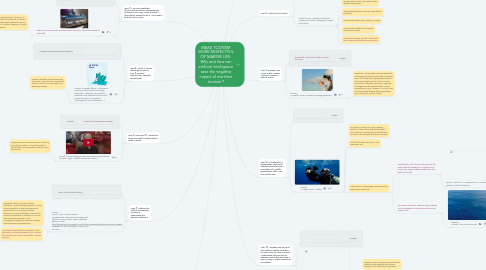
1. Step 3: I use my knowledge. 4 years ago an electric submarine was featured in the news. Since that day, I have always wanted to do it. I'm trying to find this short report.
1.1. Keywords: sous-marin électrique et touristique marseille
1.1.1. Google
1.2. Source: Un sous-marin touristique pour découvrir les fonds marins de Marseille
1.2.1. Key points: "100% électrique" It seems to be more respectful of marine life, however, what is the infrastructure needed to drive in the ocean with an electric engine? Is it really without any impact?
2. Step 4: I study a specific theme discovered in step 2: nautical activities (for example, speed boats)
2.1. Keywords: impact of touristic maritime activities
2.1.1. Google & BadGeek (podcast platform)
2.2. Source: La grande bleue - Le tourisme maritime, une manne économique - BadGeek - Hébergeur de podcasts - BadGeek vous propose tous les outils nécessaires pour vos podcasts (hébergement, RSS, statistiques,...)
2.2.1. Nautical activities are environmental nuisances: pesca-tourism, unguarded tourism, lack of communication and awareness, waste
3. Step 6: From step 5, I wanted to know more about virtual reality, I make a search
3.1. Keyword: virtual marine tourism
3.1.1. Youtube
3.2. Source: Virtual Reality, Emotion and Nature Based Tourism Dr Brent Moyle - Griffith Institute for Tourism
3.2.1. Key points: give an experience in nature by providing emotions. It could stimulate a purchasing and conservation behavior from the tourist.
4. Step 8: I refocus the subject on maritime tourism to understand the dynamics behind it
4.1. Keywords: maritime tourism
4.1.1. HEC Montreal online library
4.2. Source: Orams, Mark. Marine Tourism : Development, Impacts and Management, Taylor & Francis Group, 1998. ProQuest Ebook Central, http://ebookcentral.proquest.com/lib/hecm-ebooks/detail.action?docID=168583. Created from hecm-ebooks on 2020-10-31 06:23:41.
4.2.1. Keypoints: I have to focus on these questions: What motivates people to pursue marine recreation? What techniques are most effective in controlling human behaviour in marine settings? How can the impacts of recreational activities on marine resources be minimised? What management regimes or decision-making approaches are most effective?
4.2.2. I've mainly learnt that tourists have to be educated on the importance of our marine life, we have to create responsible "marine tourists"
5. Step 5: I let myself be guided by my curiosity and my personal experiences: I am interested in my 4D experiences in Vancouver 2 years ago
5.1. Keyword: 4D experience to explore marine life Vancouver
5.1.1. Google
5.2. https://www.vanaqua.org/explore/exhibit-4-d-theatre-shows
5.2.1. Keypoints: "Creating a world in which oceans are healthy and flourishing The Vancouver Aquarium is an Ocean Wise initiatiave. Our mission is to inspire the global community to become Ocean Wise by increasing its understanding, wonder and appreciation for our oceans."
5.2.2. It made me also think about the virtual reality, a subject I will focus on in the next step
6. Step 1: As I know nothing about this subject, I read the goal 14 of the 17 sustainable development goals
6.1. Keyword: goal 14 UN
6.1.1. Google
6.2. Source: https://www.un.org/sustainabledevelopment/oceans/
6.2.1. Key points: ocean-related tourism industry, 80% of all tourism takes place in coastal areas, manage marine tourism, life below water
7. Step 2: I make my first search
7.1. Keyword: marine tourism
7.1.1. Learning Hub
7.2. E-book source : Buckley, Ralf (2009). Adventure Tourism Management. Taylor and Francis.
7.2.1. Diving tourism (reef, cold water, sharks, whales, deep ocean),
7.2.2. Above-water adrenalin tourism (speedboats, jet boats)
7.2.3. Above-water scenic tours (sailing, cruising)
7.2.4. Above-water wildlife tours (coastal, expedition cruises)
7.2.5. Keypoint: manage coastal ecotourism, encourage sustainable marine tourism
8. Step 7: However, can virtual reality replace "physical tourism"? I make a search
8.1. Keywords: Will virtual reality replace tourism?
8.1.1. Google
8.2. Source: La réalité Virtuel en rivale du voyage physique ?
8.2.1. Keypoints: Virtual reality cannot replace the real experience that one has when traveling, even if it knows how to generate emotions and make people want to leave, to allow encounters and give meaning, to “gamify” the experience for entertainment or even see before you buy. However, it can be used in tourist places that would be prohibited from visiting (ex: certain corals)
9. Step 9: I'm looking for a documentary that could educate marine tourists, I remember of a Netflix documentary that I saw few months ago
9.1. Keywords: A plastic ocean
9.1.1. Netflix
9.2. Source: A Plastic Ocean | Netflix
9.2.1. Key points: Plastic has a very negative impact on fauna, flora and human health. This pollution is mainly due to the behavior of humans (for example tourists on cruises)
9.2.2. This kind of documentary is a real awareness tool
9.2.3. I discovered 2 interesting projects aimed to protect the marine life
9.2.3.1. Soft Robotic Fish: observe the marine life with artificial intelligence, it allows us to study how ocean pollution influences the behavior of fish.
9.2.3.1.1. source: [Vidéo] Le MIT présente SoFi, un robot poisson contrôlé à distance
9.2.3.2. The Ocean CleanUp: capture plastic thanks to an innovative, autonomous and energy neutral tool
9.2.3.2.1. website: Oceans | The Ocean Cleanup
10. Step 10: I wonder how to avoid this pollution mainly caused by tourists. From my past searches, I understood that we have to educate tourists but also have a look on them. I make a search on the subject.
10.1. keyword: monitor the marine world from tourists
10.1.1. Google
10.2. Source: Drone inspection for maritime world | Xsun
10.2.1. Keypoint: Some companies allow the sea coasts to be monitored with drones. However, is this ethically acceptable?
